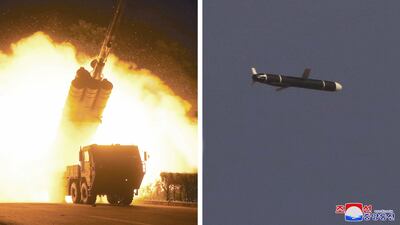North Korea successfully test-fired “new type, long-range” cruise missiles on Saturday and Sunday, the state news agency reported.
They travelled for two hours and 10 minutes above the land and water of North Korea, and hit targets 1,500 kilometres away, KCNA said.
The new missile is "a strategic weapon of great significance” in meeting the key targets of a five-year plan to develop the country's defence science and weapon system, state media reported.
“The efficiency and practicality of the weapon system operation was confirmed to be excellent,” KCNA said.
"This would be the first cruise missile in North Korea to be explicitly designated a 'strategic' role," said Ankit Panda, a senior fellow at the US-based Carnegie Endowment for International Peace. "This is a common euphemism for nuclear-capable system."
It is not clear whether North Korea has mastered the technology needed to build warheads small enough to be carried on a cruise missile, but leader Kim Jong-un said earlier this year that developing smaller bombs is a top goal.
South Korea's military did not disclose whether it had detected the tests, but said on Monday it was conducting a detailed analysis in co-operation with the United States.
Japan's government said it was "concerned" over reports of North Korea's missile test and would work closely with the US and South Korea to monitor the situation.
Last week, North Korea staged its first military-style parade since Joe Biden became US President.
Mr Kim presided over the event, where displays of his state’s weaponry were scaled down from previous exhibitions.
There were no ballistic missiles, which are faster and harder to intercept than cruise missiles, on show.
The North Korean leader did not appear to have attended the missile test, with KCNA saying Pak Jong Chon, a member of the Workers' Party's powerful politburo and a secretary of its central committee, oversaw it.
North Korea's cruise missiles usually generate less interest than ballistic missiles because they are not explicitly banned under UN Security Council resolutions.
Pentagon spokesman John Kirby on Monday declined to confirm the test but said: ”This sort of activity that has been reported just shows the kind of threat that North Korea poses."
Jeffrey Lewis, a missile researcher at the James Martin Centre for Nonproliferation Studies, said intermediate-range land-attack cruise missiles were no less a threat than ballistic missiles and were a pretty serious capability for North Korea.
"This is another system that is designed to fly under missile defence radars or around them," he said on Twitter.
Rodong Sinmun, the ruling Workers' Party's official newspaper, ran photos of the new cruise missile flying and being fired from a transporter-erector-launcher.
Experts say the missile resembles US Tomahawk cruise missiles, and are likely designed to overwhelm the missile defences of North Korea’s neighbours.
While North Korea has tested anti-ship cruise missiles before, the missiles from its latest tests are likely built with different designs and engines that provide improved range and manoeuverability, experts say.
The unveiling of the test came just a day before chief nuclear negotiators from the United States, South Korea and Japan meet in Tokyo to explore ways to break the standoff with North Korea.
China's foreign minister, Wang Yi, is also scheduled to visit Seoul on Tuesday for talks with his South Korean counterpart, Chung Eui-yong.
Mr Biden's administration has said it is open to diplomacy to achieve North Korea's denuclearisation, but has shown no willingness to ease sanctions.
Sung Kim, the U.S. envoy for North Korea, said in August in Seoul that he was ready to meet with North Korean officials "anywhere, at any time."
A reactivation of inter-Korean hotlines in July raised hopes for a restart of the negotiations, but the North stopped answering calls as annual South Korea-U.S. military exercises began last month, which Pyongyang had warned could trigger a security crisis.


